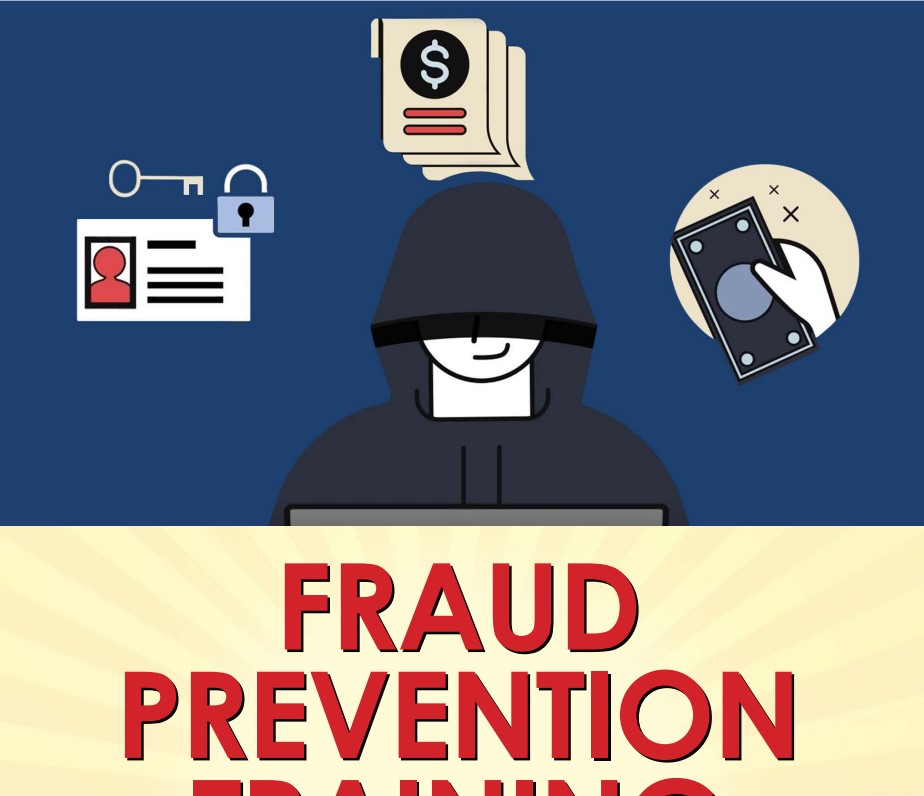Fraud Reporting & Training Required
This free training is an 8‑minute video that employees can watch on‑demand. Upon successful completion, a certificate will be provided. All certificates should be collected from employees and retained for audit.
To receive a certificate, register first, then watch the video.

Tools for Tracking
Employers are required to keep a record of the fraud training completed by each employee. Below are sample tracking sheets for you to use for this purpose. Employees also are required to fill out a Fraud Reporting Form to affirm that they have viewed the training video (see below).
Note: Employers should keep the certificates and tracking form on file to be examined during audit.
Bulletin 2024-005
Required Fraud Reporting and Training
What is the best line of defense for tackling public fraud?
Government employees reporting suspected fraud, theft, or misuse of public funds to the Auditor of State (AOS). Stamping out fraud is a team effort, and all of us need to do our part! Under Ohio law, the AOS is required to provide training to all government employees on how to report fraud, waste, and abuse. Government employers are required to track employee’s completion of the required fraud-reporting training and maintain records of such to be examined by the AOS in the course of our audit work.
Frequently Asked Questions
Here are some of the more common questions we have encountered since the required fraud training was announced.
Who is required to complete the training?
Every public employee and elected or appointed official of a political subdivision is required to complete the training. Refer to AOS Bulletin 2024-005 for more detail.
Are seasonal employees required to complete the training?
Yes, seasonal employees are required to complete the training upon initiating employment.
Group Viewing: Can we view this required training in a group setting?
Yes, the training may be viewed in a group. The individual in charge of training should maintain a sign-in sheet (like this sample sign-in sheet) to document each person’s participation. Note, only the primary registrant's name will appear on the certificate of completion — that’s fine, because the Fraud Reporting Form (located under the "Tools for Tracking" above) that each employee is required to fill out will be sufficient proof that that they have viewed the training video.
The group sign-in sheet should be maintained by the political subdivision for yearly AOS audit purposes.
Again, employers are required to keep a record of the fraud training completed by each employee, to be examined during audit.
Is the fraud training required for part-time staff, substitutes, ticket takers, coaches, student workers, and contract staff — for example, special-education aides employed through educational service centers (ESC)?
All employees and elected officials of the school district are required to watch the AOS fraud training video. If you are unsure whether someone is considered an employee, it would be a best practice for the entity to have all individuals view the video. If an individual is contracted for services by the ESC, the ESC would be responsible for ensuring that the individual views the video.
My school district already has a fraud module within Public School Works. Do we have to watch the Auditor of State (AOS) version as well?
Yes, the AOS training is a new requirement established by Ohio House Bill 33 of the 135th General Assembly and made available for viewing July 1, 2024. Note that the AOS fraud training has now been incorporated into the Public School Works framework and is acceptable for viewing. Remember to maintain documentation showing how each employee meets the requirement of watching the fraud training video.
Who constitutes an “employee” for purposes of the fraud training requirement?
An “employee” is anyone paid with public money by a political subdivision via a W-2. Independent contractors would not be considered “employees” for purposes of the fraud training requirement if they are not paid via a W-2 by the political subdivision.
What is considered a “political subdivision?”
A “political subdivision” is defined in ORC § 2744.01(F), which states in part: " 'Political subdivision' or 'subdivision' means a municipal corporation, township, county, school district, or other body corporate and politic responsible for governmental activities in a geographic area smaller than that of the state."
How long do I have to take the training once I’m hired?
New hires should complete the training within 30 days of their first day of employment.
I am a current employee; how long do I have to complete the training?
| Entity Type | Start Date | End Date * |
| County, City, Village, Township | July 1, 2024 | Sept. 28, 2024 |
| State Agency | Aug. 1, 2024 | Oct. 29, 2024 |
| Traditional School, including Joint Vocational School Districts, Educational Service Centers, & STEM/STEAM Schools |
Sept. 1, 2024 | Nov. 29, 2024 |
| Community School | Sept. 1, 2024 | Nov. 29, 2024 |
| All other entities | Oct. 1, 2024 | Dec. 29, 2024 |
| * End Date is 90 days from the Start Date. | ||
What happens if I forget to complete the training?
Your employer is responsible for tracking training requirements. Failure by any employee to complete the training may result in noncompliance being reported during your entity’s next audit.
Can we withhold compensation from an employee who refuses to watch the video?
No, compensation cannot be withheld. The entity is responsible for ensuring all employees meet the legal requirement of watching the AOS fraud training video. Contact your regional AOS representative to make them aware of the employee’s refusal. Document the steps you have taken to meet the requirement and that the employee is refusing or failing to comply.
Where can I find the training?
AOS online training can be found here: Fraud Training
How will I know I’ve completed the training?
Upon successful completion, click “View Certificate” to save or print your certificate. Your employer should maintain certificates for AOS audit purposes.
What if I have completed the training, but have misplaced my certificate?
You can retrieve your certificate by logging back into the training module and selecting “Already Registered” to retrieve your certificate.
What is considered “Fraud, Waste, and Abuse” for purposes of my reporting obligation?
Fraud is criminal behavior where a person knowingly deceives another for their own benefit.
Examples of Fraud:- Impersonating a government official to steal cash from a government cash collection point.
- Creating fictional invoices and using public funds to pay them to the benefit of yourself or a friend.
- Falsifying timesheets for the purpose of gaining additional compensation or leave time.
- Falsifying financial statements to cover up a redirecting of public money to a personal bank account.
Waste occurs when government resources are used inefficiently or unnecessarily, resulting in unnecessary costs to taxpayers.
Example of Waste:- Local government purchases new computers for staff, fails to assign them, and allows them to sit in a warehouse for years until they are obsolete.
Abuse is behavior that is outside established business practices and standards, resulting in a loss to the government. Abuse also includes misuse of authority or position for personal gain or to improperly benefit a family member or business associate.
Example of Abuse:- Allowing unneeded overtime hours, requesting staff to perform personal errands or work tasks for a supervisor or manager, misusing an official position for personal gain.
The AOS has issued AOS Bulletin 2024-005 defining Fraud, Waste, and Abuse in more detail.
How do I report Fraud, Waste, or Abuse?
There are several ways to report Fraud, Waste, or Abuse of public dollars.
- Phone: 866-FRAUD-OH (866-372-8364)
- Email: FraudOhio@ohioauditor.gov
- U.S. Mail:
- Ohio Auditor of State’s Office
- Attn: Special Investigations Unit
- 65 East State Street
- PO #1140
- Columbus, OH 43215
- Online: Fraud Report Form
- Mobile App: Ohio Stops Fraud
This information also can be found at ohioauditor.gov/fraud/report-fraud.html
If multiple employees are aware of potential Fraud, Waste, or Abuse, do they each have to report, or does one report satisfy the requirement for the entity, as long as everyone is aware?
A single report to AOS on behalf of the group is acceptable.
Can I file an anonymous fraud report with AOS?
AOS prefers that fraud reports provide the individual’s contact information so that we can follow up with the person filing the report; however, yes, anonymous reports may be filed with AOS.
What if my employer retaliates against me for reporting fraud?
Government employees who reasonably believe, and in good faith report, suspected fraud to the AOS are entitled to certain protections against employer retaliation. Ohio Rev. Code (ORC) § 124.341 extends whistleblower protections to classified and unclassified employees who file a complaint with the AOS’s fraud-reporting system. If retaliatory or disciplinary action is taken against the employee, the employee has the right to appeal with the State Personnel Board of Review within thirty (30) days after receiving actual notice of the employment action. Additional whistleblower protections are provided to state and local public officials and employees under ORC § 4113.52.
What if I don't see my question answered here?
If you don't see your question answered here, fill out this inquiries form
Please understand it may take some time to respond. We are experiencing a high volume of inquires and will respond as quickly as we can.
Printable Flyer
Print out a flyer with a QR code for your bulletin board or to hand out to your staff.
